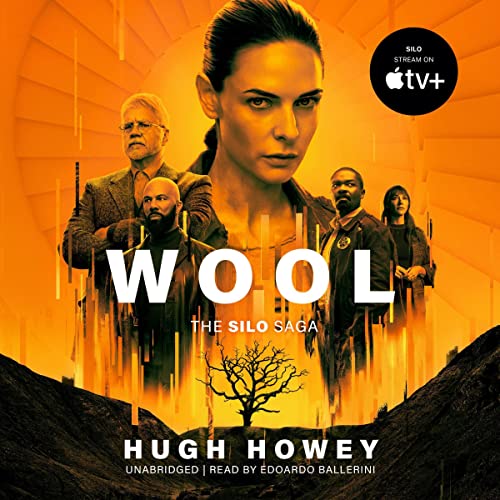Hugh Howey – Wool Audiobook
Hugh Howey – Wool (The Silo Saga, Book 1) Audiobook

Building upon the initial summary, “Wool” by Hugh Howey delves deeper into the intricacies of human society, character development, and the overarching mysteries that encapsulate the dystopian world of the silo. The audiobook brings these elements to life, enriching the experience through a skilled narrative performance that captures the emotional undertones and tension woven throughout the story.
Expanded Setting and Society
The world of “Wool” is contained within a vast, vertical silo underground, a setting that is as much a character in the story as the people who inhabit it. This engineered society is meticulously structured, both physically and socially. The upper levels are inhabited by IT and the governing administrations, symbolizing their higher status and control over the silo’s population. Lower down are the middle-class technicians, doctors, and teachers, while the depths of the silo are reserved for mechanical and agricultural workers, reflecting the social stratification.
This physical and social structure underpins the narrative, with the movement between levels in the silo often reflecting a character’s journey through the layers of truth and deceit that govern their lives. The silo’s rules are draconian; banishment for dissent is a death sentence, framed as a cleaning duty for the greater good. This cleaning ritual is a powerful manipulation tool, wrapped in the mythology of sacrifice for the visibility of the outside world.
Deep Dive into Characters
Juliette Nichols emerges as a complex heroine, an engineer from the depths who possesses not only technical expertise but also a deep-seated sense of integrity and curiosity. Her ascent to the upper levels both literally and figuratively represents her quest for truth, challenging the silo’s status quo. Her journey is fraught with dangers, as it brings her into direct conflict with the silo’s leadership, especially the head of IT, who epitomizes the oppressive control mechanisms in place.
Other characters, like the sheriff, Holston, and the mayor, Jahns, provide insights into the internal conflicts and moral dilemmas faced by those in power. Holston’s tragic quest for the truth about his wife’s death and Jahns’ motherly affection towards the silo’s inhabitants add layers to the narrative, exposing the complexities of leadership and the heavy burdens of knowledge.
Themes and Reflections
“Wool” extends beyond a simple survival story to explore profound themes. Questions of autonomy, the human right to information, and the nature of societal obedience are pivotal. The silo, with its controlled flow of information and historical records, serves as a stark metaphor for the dangers of censorship and the manipulation of truth. The story questions the price of safety and stability, and whether ignorance is truly bliss or a form of bondage.
The audiobook’s narration adds depth to these explorations, allowing listeners to connect emotionally with the characters’ struggles, to feel the claustrophobia of the silo, and to ponder the implications of living within such a tightly controlled microcosm.
Conclusion and Legacy
As the narrative unfolds, Juliette’s defiance against the silo’s governing forces becomes a beacon of hope and a catalyst for change. Her story, encapsulated in the audiobook’s immersive delivery, resonates as a testament to the indomitable human spirit. “Wool” is not just a tale of survival but a thought-provoking commentary on the essence of humanity, freedom, and the relentless pursuit of truth.
The success of “Wool” has led to it becoming a cornerstone of modern science fiction, inspiring further exploration into the Silo series and cementing Hugh Howey’s reputation as a master storyteller. The audiobook version, with its ability to heighten the narrative’s emotional impact, ensures that “Wool” remains an engrossing and enduring work, appreciated by audiences who seek depth and richness in their dystopian narratives.